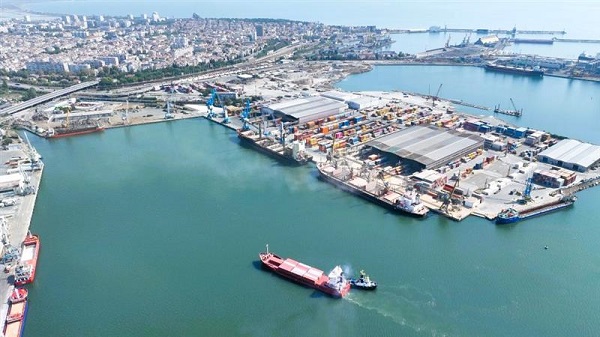Bulgaria and Kazakhstan are set to intensify efforts to develop the Trans-Caspian International Transport Route, also known as the Middle Corridor, which is becoming a vital link in transcontinental logistics connecting East and West.
The Ministry of Transport of Kazakhstan and the Ministry of Transport and Communications of the Republic of Bulgaria signed a Memorandum of Understanding on the development of the Trans-Caspian International Transport Route following talks in Astana between President Kassym-Jomart Tokayev and President of Bulgaria Rumen Radev.
The memorandum underscores the parties’ commitment to cooperate in developing the route, which aims to strengthen economic and social ties. The MoU outlines the exchange of experience and information, expansion of port infrastructure, minimization of transit times, and improvement of logistics services. These steps are aimed at increasing cargo flows linking Asia and Europe and creating an efficient transport artery.
President of Bulgaria Rumen Radev highlighted the significant potential for expanding transport links between the two countries. “Thanks to the existing land routes between Bulgaria and Türkiye and maritime connectivity across the Black Sea—linking the Bulgarian ports of Varna and Burgas with Poti Port in Georgia —the transport connection between Bulgaria and Kazakhstan has a huge potential to be efficiently expanded and increased by volume via the Middle Corridor and its extension into the Balkans,” he said in an interview with the Kazinform agency.
Radev also emphasized that the Middle Corridor could serve as a logical continuation of the Trans-European Transport Corridor VIII, which runs through Bulgaria, North Macedonia, Albania, and Italy, facilitating connectivity between the Adriatic and Black Seas.
During the summit talks at the Akorda, the transport and logistics sector was identified as a key area of Kazakh-Bulgarian cooperation. President of Kazakhstan Kassym-Jomart Tokayev noted his country’s unique geographical position: “Kazakhstan, located at the heart of Eurasia, serves as a vital link in ensuring continental connectivity. We facilitate 85% of all land transport between Europe and China. Thanks to the expanding infrastructure of the Middle Corridor, including modern railways, dry ports, and logistics centers, we are connecting East and West more efficiently than ever before.”
In 2024, cargo transportation along the Middle Corridor grew by 62%, reaching 4.5 million tons. “It is expected that by 2028, the capacity will increase to 10 million tons. We aim to expand cargo transportation along this route and welcome the inclusion of BMF Port Burgas—a key logistics hub on the Black Sea—in the Middle Corridor,” Tokayev noted during a joint business forum.
The Port of Burgas already plays a significant role in the Middle Corridor, being an associate partner of the International Association “Trans-Caspian International Transport Route.” In September 2024, BMF Port Burgas was selected as the European receiving port for a service delivering maritime containers by rail from China to Europe and back. This route, organized by Beijing Trans Eurasia International Logistics Co., passes through Kazakhstan with multiple transshipments and ushers in a new era of connectivity between Europe, Central Asia, and China.
The joint efforts of Bulgaria and Kazakhstan, underpinned by the memorandum, create a solid foundation for the growth of transcontinental transportation. The expansion of the ports of Varna and Burgas, along with connectivity to the Poti Port, promises to enhance the logistical potential of the Middle Corridor, making it a key element of the global transport network. ///nCa, 10 June 2025
